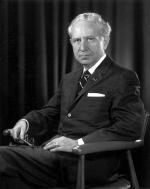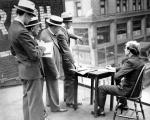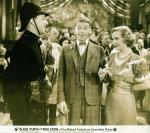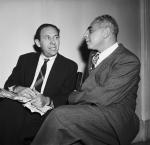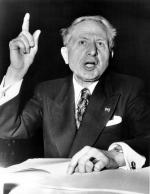![header=[Marker Text] body=[The noted jurist lived here. Pennsylvania Supreme Court Justice, 1952-68. A presiding judge, War Crimes Tribunal, Nuremberg, 1947-48. State legislator, 1929-31. Veteran of two World Wars. Author, 16 books. Buried, Arlington National Cemetery.] sign](http://explorepahistory.com/kora/files/1/10/1-A-BE-139-ExplorePAHistory-a0m9h7-a_450.jpg)
Mouse over for marker text
Name:
Michael Musmanno
Region:
Pittsburgh Region
County:
Allegheny
Marker Location:
1321 Island Ave., McKees Rocks (Pa. 51)
Dedication Date:
October 10, 1993
Behind the Marker
Pennsylvania's most vocal and flamboyant anti-communist, Michael Musmanno held a bit part in the movie Ben Hur, compared the Pennsylvania state house to "the recreation room of a home for the feeble-minded," and asked the Cincinnati Reds to change their name. Two of his more than sixteen books became movies: Black Fury, about the 1927 nationwide miners' strike, and Ten Days to Die, about Hitler's last days. He served in both world wars, joined the defense team for Sacco and Vanzetti in 1927, and was a witness for the prosecution in Adolf Eichmann's trial in 1961. Proud of his Italian heritage, he was a leading figure in the Sons of Italy, campaigned for the recognition of Columbus Day, and challenged those who argued that the Vikings or Japanese had discovered America.
Born in 1897 in Stowe Township, Musmanno worked with his father in the coal mines west of Pittsburgh, before becoming a progressive labor lawyer in Pittsburgh in the 1920s. Elected to the state legislature as a Republican in 1928, Musmanno joined Governor Gifford Pinchot in the campaign to abolish the Coal and Iron Police, long hated by steel and coal workers across the state.
Governor Gifford Pinchot in the campaign to abolish the Coal and Iron Police, long hated by steel and coal workers across the state.
In 1931, he became Pennsylvania's youngest judge, sitting on the Allegheny County Court, before leaping to the Democratic party and moving, in 1933, to the Common Court of Pleas. In World War II, Musmanno joined the Navy and rose to the rank of Rear Admiral, then served as military general of Sorrentine Peninsula in Italy, and as a judge during the Nuremberg trials. As president of the United States-Soviet Board for Forcible Repatriation after the war, he witnessed those struggling against repatriation to the Soviet Union.
When he returned to Pittsburgh's Court of Common Pleas in 1948, Musmanno discovered to his horror that a Communist Party office had opened opposite the courthouse. Musmanno's hatred of communism, which intensified as he grew older, had begun in the coalfields west of Pittsburgh, where he charged that leftists typically came from comfortable backgrounds and did not understand the workingman's life.
Musmanno's anti-communism resonated with many in Pittsburgh's eastern-European communities. Two members of that community, Judge Blair Gunter and lawyer Harry Sherman, worked to expose leftist elements in the American Slav Congress. Together they launched Americans Battling Communism (ABC), which recruited prominent politicians and worked closely with the American Legion. Seeing himself as a spokesman for the ABC, Musmanno charged that communists in the Pittsburgh local of the United Electrical workers union (UE) sought "a strategic position in the potential demoralization of American defenses."
Running for lieutenant governor in 1950, Musmanno at a Memorial Day rally at the Westinghouse Electric plant in East Pittsburgh denounced UE members as "traitors, who would dance on the graves of the sainted martyrs whom we honor on Memorial Day." That spring and summer, Musmanno pursued area communists and barred Alice Roth, the secretary of the East Pittsburgh branch of the Communist Party, from jury duty. (In Roth's successful appeal, the Pennsylvania Supreme Court condemned Musmanno.)
In July, Musmanno accused western Pennsylvania Communist party leader Steve Nelson of passing atomic secrets to the Soviets. That August, using an obscure sedition law, he obtained warrants to arrest Nelson, Andrew Onda-reputedly in charge of steel industry infiltration-and James Dolsen, a writer for the Daily Worker.
During the trial, which began in January 1951, Musmanno testified for the prosecution as a private citizen, describing a North Korean map in the party office, with "sweeping triumphant arrows portraying communist successes" and anti-American Daily Worker headlines, including "American savages destroy Korean population." In April, the movie I Was a Communist for the FBI premiered just blocks away on what Mayor David Lawrence labeled "Matt Cvetic Day." The film celebrated Michael Cvetic, an undercover agent who had infiltrated the Pittsburgh area Communist Party, and included a villain based on Nelson. Convicted for sedition in a case that drew national attention, all three were sentenced to jail terms-Nelson received a twenty-year sentence-and fines.
Mayor David Lawrence labeled "Matt Cvetic Day." The film celebrated Michael Cvetic, an undercover agent who had infiltrated the Pittsburgh area Communist Party, and included a villain based on Nelson. Convicted for sedition in a case that drew national attention, all three were sentenced to jail terms-Nelson received a twenty-year sentence-and fines.
During the trial, Musmanno also drafted a bill banning membership in any organization advocating forceful governmental overthrow, which the state legislature passed and Governor John S. Fine signed it into law in November 1951. (The state legislature also passed the Pechan Act, which required loyalty oaths of public employees.) That November, too, Musmanno won election to the Pennsylvania Supreme Court.
As Musmanno continued his anti-communist campaign on the national level, Nelson, Onda, and Dolsen appealed their convictions. In 1956, the Supreme Court overturned their convictions, and invalidated Pennsylvania's sedition laws-and those of all other states-when it ruled that sedition legislation was in the federal realm.
During his sixteen years on the court, Musmanno became known as an advocate for the underdog, and for his many dissenting opinions. When asked if he had read one of Musmanno's dissenting opinions, Pennsylvania Supreme Court Chief Justice Horace Stern once answered that he was not "interested in current fiction." Still politically ambitious, Musmanno in 1964 lost the Democratic nomination for U.S. Senate to Genevieve Blatt -and contested the voting results-losing his appeal to the Pennsylvania Supreme Court, where he remained a sitting justice.
Genevieve Blatt -and contested the voting results-losing his appeal to the Pennsylvania Supreme Court, where he remained a sitting justice.
Musmanno died on Columbus Day in 1968. Three years later, the U.S. Supreme Court invalidated the federal law prohibiting the Communist Party, which Musmanno had helped author in 1954.
Born in 1897 in Stowe Township, Musmanno worked with his father in the coal mines west of Pittsburgh, before becoming a progressive labor lawyer in Pittsburgh in the 1920s. Elected to the state legislature as a Republican in 1928, Musmanno joined
In 1931, he became Pennsylvania's youngest judge, sitting on the Allegheny County Court, before leaping to the Democratic party and moving, in 1933, to the Common Court of Pleas. In World War II, Musmanno joined the Navy and rose to the rank of Rear Admiral, then served as military general of Sorrentine Peninsula in Italy, and as a judge during the Nuremberg trials. As president of the United States-Soviet Board for Forcible Repatriation after the war, he witnessed those struggling against repatriation to the Soviet Union.
When he returned to Pittsburgh's Court of Common Pleas in 1948, Musmanno discovered to his horror that a Communist Party office had opened opposite the courthouse. Musmanno's hatred of communism, which intensified as he grew older, had begun in the coalfields west of Pittsburgh, where he charged that leftists typically came from comfortable backgrounds and did not understand the workingman's life.
Musmanno's anti-communism resonated with many in Pittsburgh's eastern-European communities. Two members of that community, Judge Blair Gunter and lawyer Harry Sherman, worked to expose leftist elements in the American Slav Congress. Together they launched Americans Battling Communism (ABC), which recruited prominent politicians and worked closely with the American Legion. Seeing himself as a spokesman for the ABC, Musmanno charged that communists in the Pittsburgh local of the United Electrical workers union (UE) sought "a strategic position in the potential demoralization of American defenses."
Running for lieutenant governor in 1950, Musmanno at a Memorial Day rally at the Westinghouse Electric plant in East Pittsburgh denounced UE members as "traitors, who would dance on the graves of the sainted martyrs whom we honor on Memorial Day." That spring and summer, Musmanno pursued area communists and barred Alice Roth, the secretary of the East Pittsburgh branch of the Communist Party, from jury duty. (In Roth's successful appeal, the Pennsylvania Supreme Court condemned Musmanno.)
In July, Musmanno accused western Pennsylvania Communist party leader Steve Nelson of passing atomic secrets to the Soviets. That August, using an obscure sedition law, he obtained warrants to arrest Nelson, Andrew Onda-reputedly in charge of steel industry infiltration-and James Dolsen, a writer for the Daily Worker.
During the trial, which began in January 1951, Musmanno testified for the prosecution as a private citizen, describing a North Korean map in the party office, with "sweeping triumphant arrows portraying communist successes" and anti-American Daily Worker headlines, including "American savages destroy Korean population." In April, the movie I Was a Communist for the FBI premiered just blocks away on what
During the trial, Musmanno also drafted a bill banning membership in any organization advocating forceful governmental overthrow, which the state legislature passed and Governor John S. Fine signed it into law in November 1951. (The state legislature also passed the Pechan Act, which required loyalty oaths of public employees.) That November, too, Musmanno won election to the Pennsylvania Supreme Court.
As Musmanno continued his anti-communist campaign on the national level, Nelson, Onda, and Dolsen appealed their convictions. In 1956, the Supreme Court overturned their convictions, and invalidated Pennsylvania's sedition laws-and those of all other states-when it ruled that sedition legislation was in the federal realm.
During his sixteen years on the court, Musmanno became known as an advocate for the underdog, and for his many dissenting opinions. When asked if he had read one of Musmanno's dissenting opinions, Pennsylvania Supreme Court Chief Justice Horace Stern once answered that he was not "interested in current fiction." Still politically ambitious, Musmanno in 1964 lost the Democratic nomination for U.S. Senate to
Musmanno died on Columbus Day in 1968. Three years later, the U.S. Supreme Court invalidated the federal law prohibiting the Communist Party, which Musmanno had helped author in 1954.




